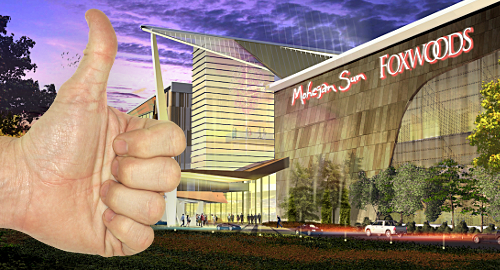 Connecticut legislators have approved a joint venture casino project by the state’s two tribal gaming operators, but MGM Resorts says it will continue to fight the plan in federal court.
Connecticut legislators have approved a joint venture casino project by the state’s two tribal gaming operators, but MGM Resorts says it will continue to fight the plan in federal court.
On Tuesday, with the clock ticking on the legislature’s current session, the state Assembly voted 103 to 46 in favor of a bill that will allow the Mashantucket Pequot and Mohegan tribes’ MMCT joint venture to build a casino off tribal land near East Windsor. The Senate has already approved the plan, and Gov. Dannel Malloy is expected to sign the bill into law any day now.
The tribes, which operate the state’s Foxwoods and Mohegan Sun casinos, sought the third casino as a hedge against MGM Springfield, which will open just over the Massachusetts border in September 2018, and is expected to siphon Connecticut gamblers away from their state’s tribal casinos.
MGM had supported a rival bill that called for an open tender for the third casino license, but the tribes argued that this would violate their gaming compacts, which guarantees them slot machine exclusivity in exchange for 25% of their slots revenue. The bill passed on Tuesday requires the tribes to ante up 25% of slots and table game revenue from the third casino.
While the tribes were understandably elated by Tuesday’s vote, MGM is vowing to continue its legal fight against the plan, which the company claims violates the US Constitution’s Equal Protection and Commerce clauses. MGM legal counsel Uri Clinton said the vow to pursue the matter in US District Court was “not a threat. That’s a promise.”
The Schagticoke Tribal Nation, which has expressed an interest in launching its own tribal gaming operation in Connecticut, released a statement saying it too would continue to press its legal case against the MMCT joint venture.
To build support for the third casino bill, the House also approved measures on Tuesday to expand the number of off-track betting locations in the state from 18 to 24. The state’s OTB operations are run by UK operator Sportech.
The House also directed the state’s Department of Consumer Protection to establish a framework for legal sports betting. This directive is entirely dependent on a shift in the federal government’s longstanding prohibition on legal sports betting, which could come to a head later this month if the US Supreme Court opts to hear New Jersey’s legal challenge of the federal PASPA betting ban.